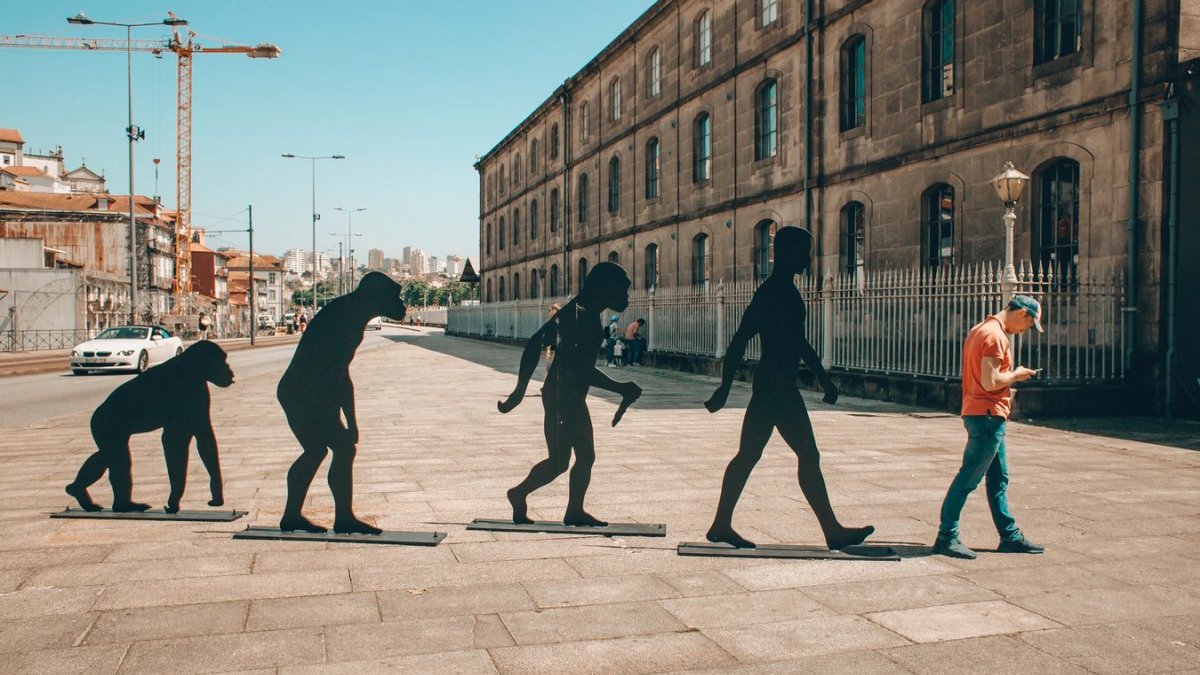
There are countless theories on human evolution, as well as even more ideas on how it all started. However, there is also lots of science involved, and some aspects are crystal clear. All in all, here are some of the best books on human evolution – something simple and direct with no overwhelming or sophisticated ideas.
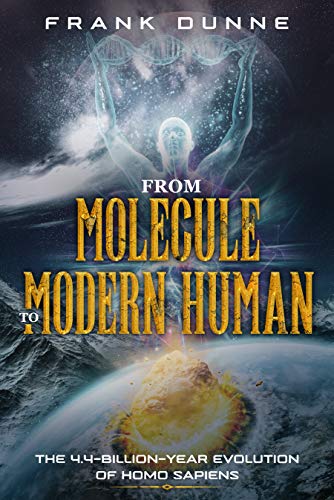
From Molecule to Modern Human, by Frank Dunne
Frank Dunne introduces the reader to an interesting approach on human evolution. It is easy to read and straightforward – whether or not you like this field, you will find it extremely interesting. All in all, the book is split into two different parts, and each of them targets a completely different part of human evolution.
The first part is split into six different chapters. It begins with the initial story of human evolution – the beginning of the planet, the molecules and cells of life, and so on. You get to know how the first beings came out of nowhere – nothing but pure science. It is all about evolution and the development of cells over millions of years.
The story moves on further and takes the reader through an incredible journey. One thing leads to another as species evolve. The book reaches the final stage of human evolution and shows how the modern Homo sapiens appeared. As you reach the second part, you go through eight different essays on different points of view regarding evolution.
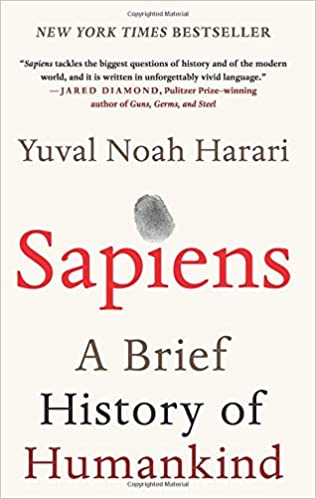
Sapiens, by Yuval Noah Harari
The story begins about 100,000 years ago, when there were six different species of humans inhabiting the planet. These days, there is just one left – Homo sapiens. How did it happen? How did the humankind get here? There was obviously a battle for evolution and dominance, and the current species won the battle.
The book answers many questions regarding civilization. Why did species come together? How did cities and kingdoms come out? Who brought in the gods? How about laws, money, and bureaucracy? The author goes through the entire human history, from the first people who walked around to the modern destruction caused by various revolutions.
Different currents in the history have targeted different aspects of life. Animals have evolved, as well as plants and cities. People’s personalities have also changed overtime, as well as the overall lifestyle. Can the modern Homo sapiens escape history? Can people challenge the heritage left by ancestors? There is only one way to find out.

The Complete World of Human Evolution, by Chris Stringer and Peter Andrews
Human evolution began with more species, and the domination is now complete. The Homo sapiens dominate the world. How did the humankind get here? The first apes inhabited the planet about 20 million years ago. The actual man has come around about 150,000 years ago. Many species came out and disappeared, yet one of them has thrived.
This book is up to date with the latest discoveries in this field. It is split into three different parts, and each of them has a specific role. The book is easy to read and does not require any prior knowledge or experience. It examines fossils and signs left by ancestors and what they are actually trying to tell the modern individual.
At times, the author goes into small details, but the accessible profile of the book makes it extremely interesting. Apart from the actual evolution in species, the author is also focused on how behaviors and personalities have changed overtime. Furthermore, there are lots of interesting illustrations to help the reader understand more.
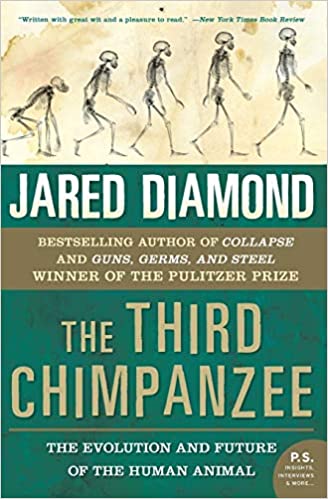
The Third Chimpanzee, by Jared Diamond
Jared Diamond’s analysis is one of the best books on human evolution and tries to figure out what happened over the past 100,000 years. Humans started evolving and made the difference in how the world evolved. The species became the most popular one and created various aspects of life – from art and religion to nuclear weapons and cars. The evolutionary time felt like a second.
Now, there are more things that target the world and pose some serious threats – climate change and nuclear weapons. It looks like the innate hunger from conflict has led humans from one conflict to another, and the world is about to explode again. Where do all these come from? What caused these natural tendencies? Is there any hope in the future?
Things could, indeed, change. However, history has taught everyone that it repeats itself every now and then. Jared Diamond’s book is an analysis of human traits, but it also aims to help people realize that change is necessary to change the outcome. The book targets the past, the present, and the future in a touching manner.
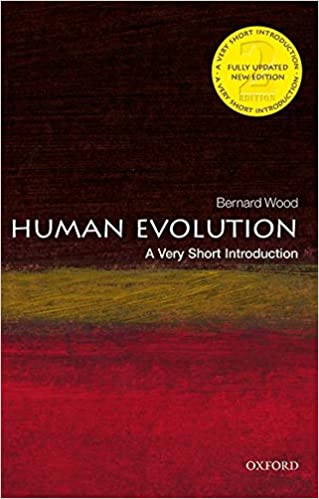
Human Evolution, by Bernard Wood
Bernard Wood’s work came out as the direct consequence of the discovery of a new species. The tiny Homo floresiensis – also referred to as the hobbit – used to inhabit Indonesia and the surroundings. This relatively new discovery has brought in even more interest in studying the human evolution – there are obviously many things still waiting to be discovered.
The author analyzes the history of paleoanthropology, as well as the results associated with it. The book works on the discoveries made by humankind since the beginning. It all started more than 200 years ago and every few years brought in some interesting discoveries. Given its recent profile, the book also mentions the latest discoveries in this field.
Bernard Wood relies on more than three decades of experience to help people understand how they have evolved in a friendly and straightforward manner. He aims to underline that understanding evolution is critical for further generations, as things are far from being over. Sure, evolution is slow, but things will eventually change at some point or another.
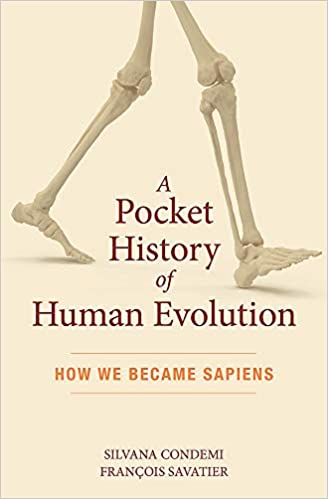
A Pocket History of Human Evolution, by Francois Savatier and Gerd-Christian Weniger Silvana Condemi
Prehistory may seem boring to some, but this book makes it exciting and easy to understand. There are lots of new discoveries out there and many theories – some of them with a real base, while others are based on nothing but assumptions. New discoveries change many beliefs and myths – such as the stone tools found in Australia. Dating about 65,000 years ago, it was obvious that the first people left Africa way before that.
Then, DNA research has brought in the discovery of some new species – with the Denisovans changing the way the Homo sapiens was created. There were definitely more species out there, and crossbreeding led to even more. The Homo sapiens is the result of one of these crossbreeding episodes. The book explores the past, but also modern trends in human behavior.
So, what exactly led to this evolution? Why did the humankind evolve faster than animals? Some say that larger brains are responsible for it. Some others blame the feeling of empathy, not to mention the language. Why is the Homo sapiens the only survivor from all these species? There are some interesting conclusions and answers in this book that will make you want to find out more.
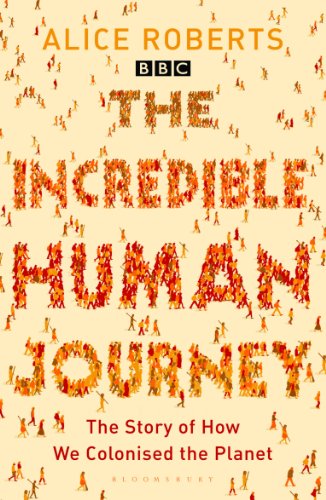
The Incredible Human Journey, by Alice Roberts
Alice Roberts has actually traveled around the world in order to figure out how the first people on the planet struggled to reach from one place to another and settle in different parts of the world. While relatively simple these days, ancestors had a hard time exploring deserts, oceans, or mountains, not to mention natural disasters that no one had clues about – such as volcanoes. However, as she learned more about people, she realized that the environment was not the biggest challenge – but the actual humankind.
When the first humans in the world left Africa, it seems that there were two other species out there – one in Asia and another one in Europe. All species were quite intelligent and able to make their own tools and weapons. Now, the main question is – why did only one survive? The Homo sapiens is the only species that is still out there. There must have been a glitch somewhere, and this is what the author is trying to figure out.
From some points of view, the book is a detective story. From other points of view, it is a traveling book. It also brings in some interesting archaeological discoveries and aims to determine how ancestors have managed to go through a plethora of challenges. The author is also trying to underline how close different races actually are. While people seem different, they are actually quite similar and belong to the same large group.
Conclusion
As a short final conclusion, these are some of the best books on human evolution to explore your curiosity and trigger some question marks. They are appealing, interesting, and well written – you do not have to be an expert to understand what the world has always been about. They are written for the least experiences, and they are easy to understand – accessible sources of information that anyone can enjoy.
